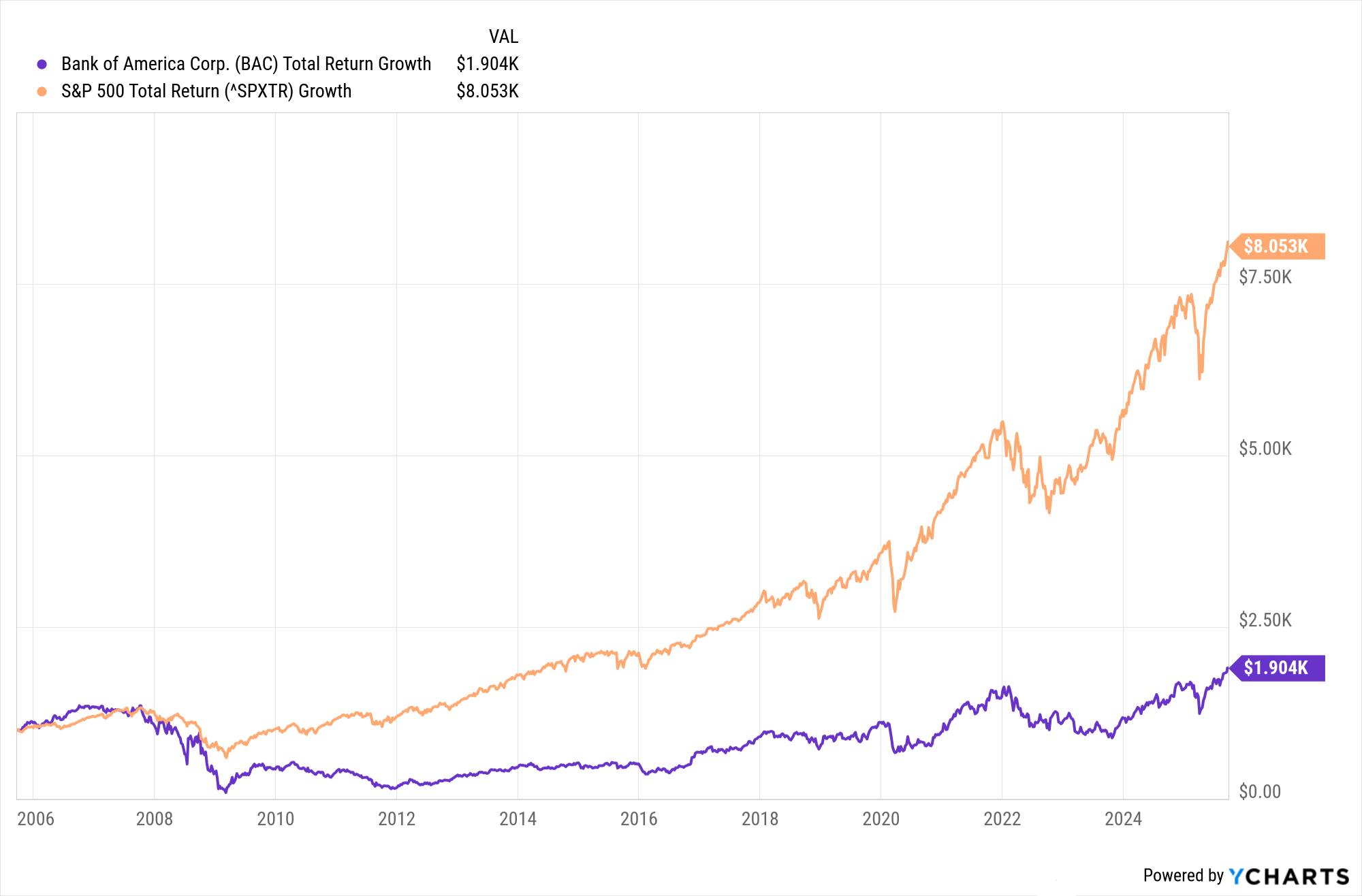If You'd Put $1,000 Into Bank of America Stock 20 Years Ago, Here's What You'd Have Today
Bank of America stock has been a massive buy-and-hold bust.



Profit and prosper with the best of Kiplinger's advice on investing, taxes, retirement, personal finance and much more. Delivered daily. Enter your email in the box and click Sign Me Up.
You are now subscribed
Your newsletter sign-up was successful
Want to add more newsletters?

Delivered daily
Kiplinger Today
Profit and prosper with the best of Kiplinger's advice on investing, taxes, retirement, personal finance and much more delivered daily. Smart money moves start here.

Sent five days a week
Kiplinger A Step Ahead
Get practical help to make better financial decisions in your everyday life, from spending to savings on top deals.

Delivered daily
Kiplinger Closing Bell
Get today's biggest financial and investing headlines delivered to your inbox every day the U.S. stock market is open.

Sent twice a week
Kiplinger Adviser Intel
Financial pros across the country share best practices and fresh tactics to preserve and grow your wealth.

Delivered weekly
Kiplinger Tax Tips
Trim your federal and state tax bills with practical tax-planning and tax-cutting strategies.

Sent twice a week
Kiplinger Retirement Tips
Your twice-a-week guide to planning and enjoying a financially secure and richly rewarding retirement

Sent bimonthly.
Kiplinger Adviser Angle
Insights for advisers, wealth managers and other financial professionals.

Sent twice a week
Kiplinger Investing Weekly
Your twice-a-week roundup of promising stocks, funds, companies and industries you should consider, ones you should avoid, and why.

Sent weekly for six weeks
Kiplinger Invest for Retirement
Your step-by-step six-part series on how to invest for retirement, from devising a successful strategy to exactly which investments to choose.
Bank of America (BAC) stock has been one of the better bets among large-cap financials in the past few years — but as a long-term holding, it leaves everything to be desired.
True, shares in the nation's second biggest bank by assets generated an annualized total return (price change plus dividends) of more than 20% in the past five years. That beats the broader market by about 4 percentage points.
It's not for nothing that BAC remains one of Warren Buffett's favorite stocks. Berkshire Hathaway initiated a position in BAC in the third quarter of 2017. While Buffett has exited stakes in a host of other financial names through the years, BAC is still Berkshire's third-largest holding.
From just $107.88 $24.99 for Kiplinger Personal Finance
Become a smarter, better informed investor. Subscribe from just $107.88 $24.99, plus get up to 4 Special Issues

Sign up for Kiplinger’s Free Newsletters
Profit and prosper with the best of expert advice on investing, taxes, retirement, personal finance and more - straight to your e-mail.
Profit and prosper with the best of expert advice - straight to your e-mail.
BAC accounts for more than 11% of the value of Berkshire's U.S. equity portfolio. Meanwhile, with more than 8% of its shares outstanding, Berkshire is Bank of America's second-largest investor after Vanguard.
It's hard not to like a stock so beloved by Warren Buffett, especially when he's gone out of his way to praise the bank's management.
Wall Street likes BAC, too. Of the 25 analysts covering the stock surveyed by S&P Global Market Intelligence, 14 rate it at Strong Buy, seven say Buy, three have it at Hold, and one calls it a Sell. That works out to a consensus recommendation of Buy, with very high conviction.
"We believe that the current BAC share price undervalues the franchise given ongoing improvement in return metrics and continued positive operating leverage," writes Argus Research analyst Stephen Biggar, who rates the financial stock at Buy.
As bright as BAC's prospects might be, shares have been a truly dreadful buy-and-hold bet.
Blame the Great Recession
Bank of America was formed when NationsBank acquired BankAmerica in the late 1990s to create the country's first coast-to-coast bank. The firm followed up with other megadeals, such as scooping up FleetBoston Financial, MBNA and U.S. Trust.
Sadly, the bank's hunger for deals was ultimately its undoing.
When the housing market imploded and the Great Recession hit, Bank of America went shopping. The firm's acquisition (with government assistance) of Merrill Lynch worked out. Its purchase of Countrywide, then the nation's largest mortgage lender, did not.
With a deal price of about $4 billion in stock, Countrywide looked like a fire-sale bargain. Instead, it saddled BAC with hundreds of billions of dollars in bad loans and tens of billions of dollars in legal settlements.
A stock that traded north of $50 in 2007 went for less than $5 in March 2009. More than four years later, BAC stock was still below $15. That made shares essentially immaterial among the price-weighted Dow Jones stocks. In the fall of 2013, BAC was replaced in the blue-chip barometer by Goldman Sachs (GS).
The bottom line on Bank of America stock
Bank of America has been a terrible buy-and-hold bet. In its entire life as a publicly traded company, BAC has generated an annualized total return of just 4.3%. The S&P 500, by comparison, returned 10.8% in the same time frame.
Shares also lag the broader market in the past 10 and 15 years. True, the stock has been a winner in the past five years — and doubles the performance of the S&P 500 in the past 52 weeks.
But for the past two decades? It's sort of unforgivable.

Have a look at the above chart, and you'll see that if you invested $1,000 in BAC stock 20 years ago, today your stake would be worth about $1,900 — good for an annualized total return of 3.3%.
The same amount invested in the S&P 500 would theoretically be worth about $8,000 today, or an annualized total return of almost 11%.
Past performance is not a guarantee of future results. Let us pray we never see something like the Great Recession again.
If nothing else, BAC's 20-year return shows how the damage inflicted by the global crisis continues to haunt investors to this day.
More Stocks of the Past 20 Years
- If You'd Put $1,000 Into Oracle Stock 20 Years Ago, Here's What You'd Have Today
- If You'd Put $1,000 Into Berkshire Hathaway Stock 20 Years Ago, Here's What You'd Have Today
- If You'd Put $1,000 Into Apple Stock 20 Years Ago, Here's What You'd Have Today
Profit and prosper with the best of Kiplinger's advice on investing, taxes, retirement, personal finance and much more. Delivered daily. Enter your email in the box and click Sign Me Up.

Dan Burrows is Kiplinger's senior investing writer, having joined the publication full time in 2016.
A long-time financial journalist, Dan is a veteran of MarketWatch, CBS MoneyWatch, SmartMoney, InvestorPlace, DailyFinance and other tier 1 national publications. He has written for The Wall Street Journal, Bloomberg and Consumer Reports and his stories have appeared in the New York Daily News, the San Jose Mercury News and Investor's Business Daily, among many other outlets. As a senior writer at AOL's DailyFinance, Dan reported market news from the floor of the New York Stock Exchange.
Once upon a time – before his days as a financial reporter and assistant financial editor at legendary fashion trade paper Women's Wear Daily – Dan worked for Spy magazine, scribbled away at Time Inc. and contributed to Maxim magazine back when lad mags were a thing. He's also written for Esquire magazine's Dubious Achievements Awards.
In his current role at Kiplinger, Dan writes about markets and macroeconomics.
Dan holds a bachelor's degree from Oberlin College and a master's degree from Columbia University.
Disclosure: Dan does not trade individual stocks or securities. He is eternally long the U.S equity market, primarily through tax-advantaged accounts.
-
 Quiz: Do You Know How to Avoid the "Medigap Trap?"
Quiz: Do You Know How to Avoid the "Medigap Trap?"Quiz Test your basic knowledge of the "Medigap Trap" in our quick quiz.
-
 5 Top Tax-Efficient Mutual Funds for Smarter Investing
5 Top Tax-Efficient Mutual Funds for Smarter InvestingMutual funds are many things, but "tax-friendly" usually isn't one of them. These are the exceptions.
-
 AI Sparks Existential Crisis for Software Stocks
AI Sparks Existential Crisis for Software StocksThe Kiplinger Letter Fears that SaaS subscription software could be rendered obsolete by artificial intelligence make investors jittery.
-
 5 Top Tax-Efficient Mutual Funds for Smarter Investing
5 Top Tax-Efficient Mutual Funds for Smarter InvestingMutual funds are many things, but "tax-friendly" usually isn't one of them. These are the exceptions.
-
 Why Invest In Mutual Funds When ETFs Exist?
Why Invest In Mutual Funds When ETFs Exist?Exchange-traded funds are cheaper, more tax-efficient and more flexible. But don't put mutual funds out to pasture quite yet.
-
 Social Security Break-Even Math Is Helpful, But Don't Let It Dictate When You'll File
Social Security Break-Even Math Is Helpful, But Don't Let It Dictate When You'll FileYour Social Security break-even age tells you how long you'd need to live for delaying to pay off, but shouldn't be the sole basis for deciding when to claim.
-
 I'm an Opportunity Zone Pro: This Is How to Deliver Roth-Like Tax-Free Growth (Without Contribution Limits)
I'm an Opportunity Zone Pro: This Is How to Deliver Roth-Like Tax-Free Growth (Without Contribution Limits)Investors who combine Roth IRAs, the gold standard of tax-free savings, with qualified opportunity funds could enjoy decades of tax-free growth.
-
 One of the Most Powerful Wealth-Building Moves a Woman Can Make: A Midcareer Pivot
One of the Most Powerful Wealth-Building Moves a Woman Can Make: A Midcareer PivotIf it feels like you can't sustain what you're doing for the next 20 years, it's time for an honest look at what's draining you and what energizes you.
-
 Stocks Make More Big Up and Down Moves: Stock Market Today
Stocks Make More Big Up and Down Moves: Stock Market TodayThe impact of revolutionary technology has replaced world-changing trade policy as the major variable for markets, with mixed results for sectors and stocks.
-
 I'm a Wealth Adviser Obsessed With Mahjong: Here Are 8 Ways It Can Teach Us How to Manage Our Money
I'm a Wealth Adviser Obsessed With Mahjong: Here Are 8 Ways It Can Teach Us How to Manage Our MoneyThis increasingly popular Chinese game can teach us not only how to help manage our money but also how important it is to connect with other people.
-
 Looking for a Financial Book That Won't Put Your Young Adult to Sleep? This One Makes 'Cents'
Looking for a Financial Book That Won't Put Your Young Adult to Sleep? This One Makes 'Cents'"Wealth Your Way" by Cosmo DeStefano offers a highly accessible guide for young adults and their parents on building wealth through simple, consistent habits.